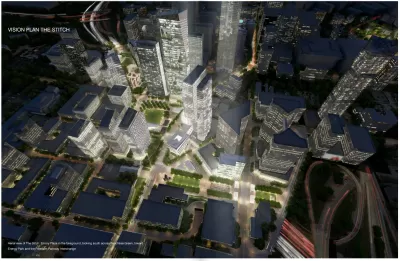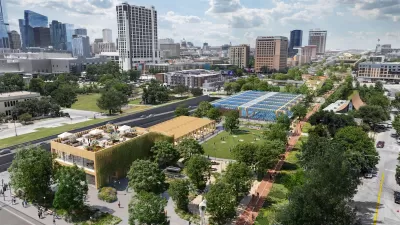A trio of freeway cap proposals around the country—in St. Paul, Atlanta, and Austin—embody the potential of infrastructure change to undo the mistakes of the past.

Adina Solomon writes a summary of a recent ULI webinar hosted by the Curtis Infrastructure Initiative in provided information on the status and ambitions of three freeway cap projects, located in Atlanta, Austin, and St. Paul.
According to the premise of the webinar, COVID-19 and the ongoing civil unrest in response to recent police violence have renewed concerns about the legacy of land use and development. A new take on infrastructure, embodied by the symbolism and reality of freeway cap parks, was described by the webinar panel as a solution to the "economic malaise" impacting the nation, as well as the racist and discriminatory outcomes of 20th century planning.
In St. Paul, the nonprofit group ReConnect Rondo is spearheading a project that would add a land bridge over Interstate 94 "to bring equity to the Rondo neighborhood, where 85 percent of the city’s Black population lived in the 1950s and 1960s."
"The Rondo Community Land Bridge would create about 500 new housing units," reports Solomon. "More than 700 Black-owned homes were destroyed to make way for I-94."
In Atlanta, Central Atlanta Progress (CAP) is working to create “the Stitch,” to fill a need for parks in Atlanta's downtown. "[T]he construction of Interstate 75/85 cut up downtown and eliminated a grid of mostly Black neighborhoods, along with what was once the largest Jewish community in the city," according to Solomon.
Finally, the plan in Austin "is to create 11 acres (4.5 ha) of surface area out of proposed I-35 caps in three locations, in addition to creating a boulevard along the entire length of the 2.5-mile (4 km) corridor."
FULL STORY: Three U.S. ‘Highway Cap’ Projects Reckoning with Urban Inequity

Maui's Vacation Rental Debate Turns Ugly
Verbal attacks, misinformation campaigns and fistfights plague a high-stakes debate to convert thousands of vacation rentals into long-term housing.

Planetizen Federal Action Tracker
A weekly monitor of how Trump’s orders and actions are impacting planners and planning in America.

San Francisco Suspends Traffic Calming Amidst Record Deaths
Citing “a challenging fiscal landscape,” the city will cease the program on the heels of 42 traffic deaths, including 24 pedestrians.

Defunct Pittsburgh Power Plant to Become Residential Tower
A decommissioned steam heat plant will be redeveloped into almost 100 affordable housing units.

Trump Prompts Restructuring of Transportation Research Board in “Unprecedented Overreach”
The TRB has eliminated more than half of its committees including those focused on climate, equity, and cities.

Amtrak Rolls Out New Orleans to Alabama “Mardi Gras” Train
The new service will operate morning and evening departures between Mobile and New Orleans.
Urban Design for Planners 1: Software Tools
This six-course series explores essential urban design concepts using open source software and equips planners with the tools they need to participate fully in the urban design process.
Planning for Universal Design
Learn the tools for implementing Universal Design in planning regulations.
Heyer Gruel & Associates PA
JM Goldson LLC
Custer County Colorado
City of Camden Redevelopment Agency
City of Astoria
Transportation Research & Education Center (TREC) at Portland State University
Jefferson Parish Government
Camden Redevelopment Agency
City of Claremont





























